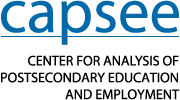By: Nikki Edgecombe & Jasmine M. Sanders | September 2018
This paper compares credential production patterns of minority-serving institutions (MSIs) and non-MSIs by field of study and examines the extent to which they correspond to employment industry clusters in Alabama and California.
By: Di Xu, Shanna Smith Jaggars, & Jeffrey Fletcher | April 2016
Using detailed administrative data from Virginia, this paper and journal article examine how and why the community college pathway to a baccalaureate influences students’ degree attainment and short-term labor market performance.
In an Era of Inequity, More and More College Financial Aid is Going to the Rich | 12/7/2017
The Hechinger Report writes about the shift in financial aid to benefit students with more financial resources, citing CAPSEE research on the Federal Work-Study Program.
Why Some States Are Making Short-Term Training Free | 5/3/2017
Thomas Bailey considers the benefits and drawbacks of short-term certificates in light of CAPSEE findings on the returns to certificates and degrees in the Pew Charitable Trusts’ Stateline blog.
Research: Community College Pays Off | 4/18/2017
Campus Technology writes about CAPSEE research on returns to college degrees and the Center’s conclusion that college “pays off.”
Report: Associate’s Degree Worth $6K in Additional Pay | 4/13/2017
Diverse: Issues in Higher Education writes about CAPSEE’s new report synthesizing the results of studies in eight states on the returns to associate degrees and certificates.
NEW YORK, NY (April 18, 2017) — CAPSEE’s final conference in Washington, DC on April 6–7 featured research on the relationship between education and the new economy and addressed major themes around individual and societal investments in college education and their implications.
Everybody in Washington Agrees That This Is a Problem. So Why Won’t They Fix It? | 4/7/2017
In this Money magazine story on FAFSA simplification, Judith Scott-Clayton argues only a few questions are needed to determine a student’s contribution to college costs.
By: Clive Belfield & Thomas Bailey | April 2017
This paper reviews results from fixed effects models of the earnings gains from completing an associate degree and compares them with ordinary least squares model estimates.
By: Veronica Minaya & Judith Scott-Clayton | April 2017
This paper examines returns to terminal associate degrees and certificates up to 11 years after students initially entered a community college in Ohio using an individual fixed-effects approach that controls for students’ pre-enrollment earnings and allows the returns to credential completion to vary over time.
